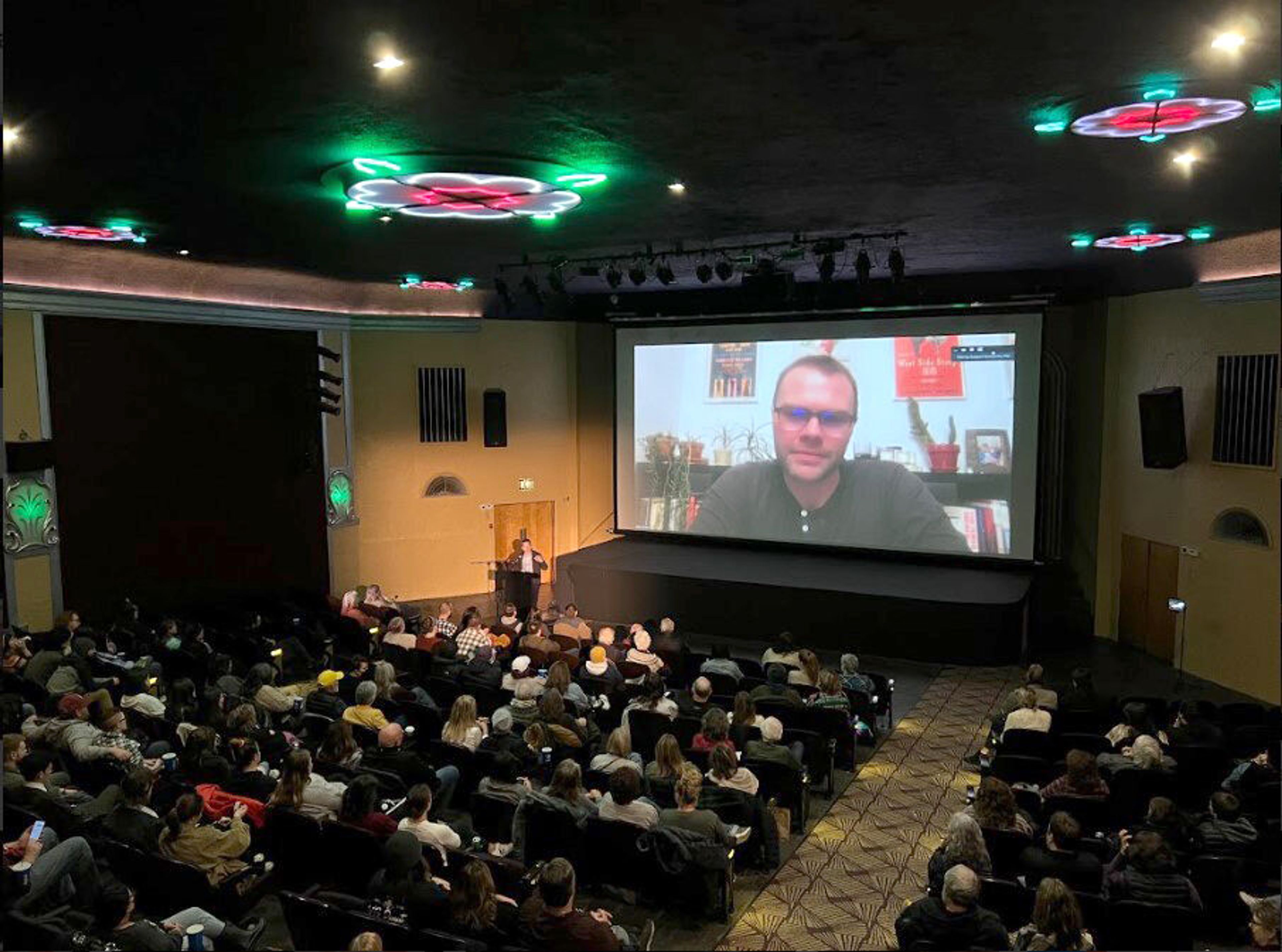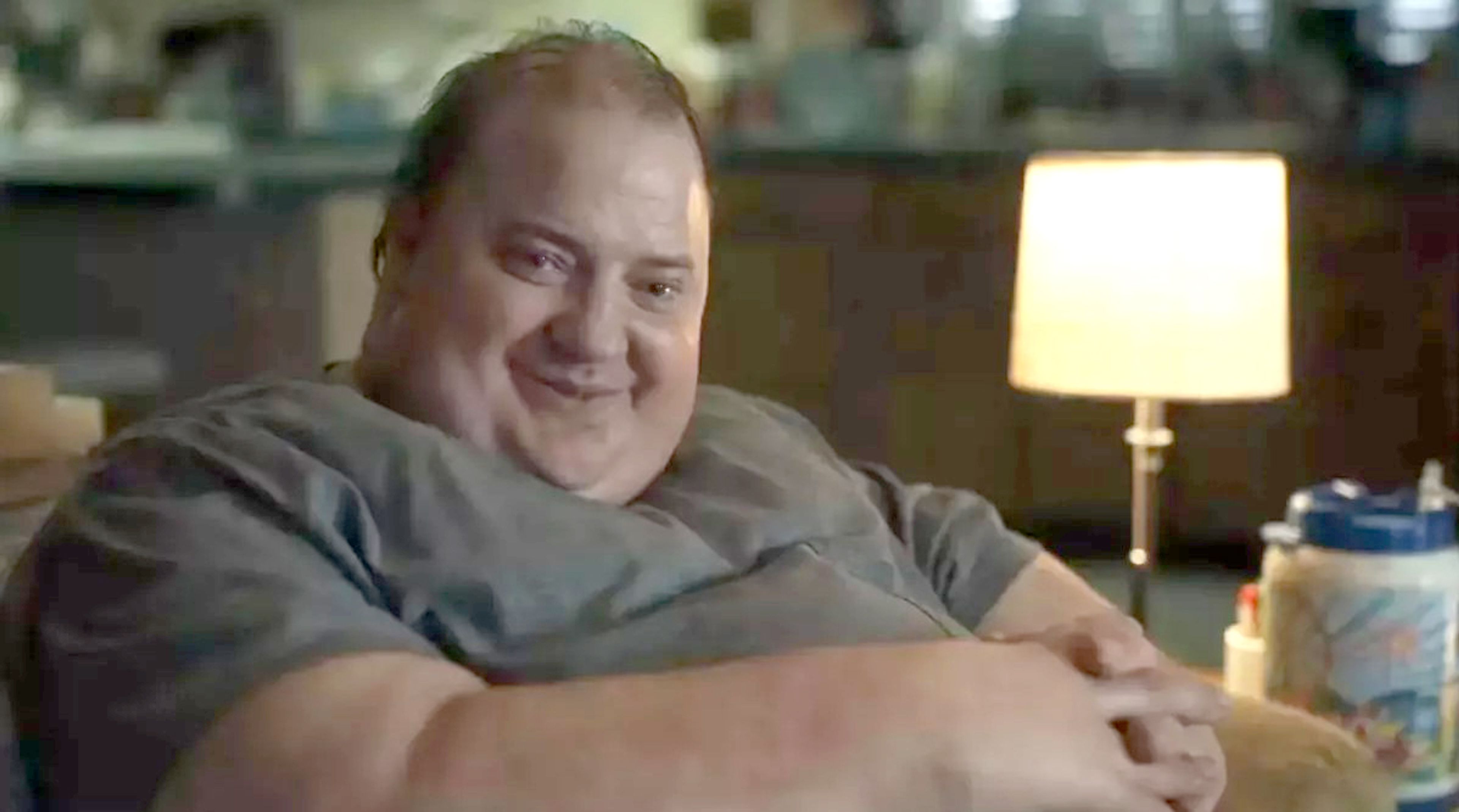The tale behind ‘The Whale’
In Q&A at Kenworthy, writer Sam Hunter talks entertainingly about his hit movie, the talents of Oscar nominee Brendan Fraser — and religion
As a young teacher of essay writing more than a decade ago at Rutgers University in New Jersey, Sam Hunter found himself pushing a type of prose that seemed in opposition to his work as a playwright. He was urging his students — or his students thought he was urging them — to depersonalize their writing, to drain it of emotion and subjectivity.
Disappointed by the results, Hunter eventually threw his hands up and implored his disaffected pupils to “Just write something honest.”
Riding the commuter train from New Jersey to his home in New York City one night — as Hunter recalls in a recent essay in the Los Angeles Times — he was floored by a student’s response to his request. The young pupil had produced a line so raw and real that it survives to this day in Hunter’s first movie script, an adaptation of his play “The Whale.”
“I think I need to accept that my life isn’t going to be very exciting,” the student wrote.
Hunter, 41, the Moscow High School graduate who now lives in New York City and whose daily rhythms have been transformed by the success of “The Whale,” recounted the story Sunday afternoon in a striking Zoom Q&A after the final screening of the film at the Kenworthy Performing Arts Centre in Moscow.
The student’s line of prose was a key moment in Hunter’s conception of what’s becoming his signature work, the story of an online expository writing teacher in an Idaho university town with a terrible secret: severe obesity that threatens his life and complicates his efforts to reconnect with his teenage daughter.
“I wrote the first draft really tenuously,” he told a near-capacity crowd of 220 at the Kenworthy. “It was one of the most earnest and heart-on-the-sleeve things I’d ever written at the time. And so I was worried about it, because I thought it was deeply unfashionable in terms of the off-Broadway theater (world) that I’d aspired to be a part of.”
Thirteen years later, the project has developed into a $3 million film directed by Darren Aronofsky that has earned more than $13 million in its first six weeks of distribution and revived the career of actor Brendan Fraser, who was named best actor earlier this month at the Critics’ Choice Awards. On Tuesday, Fraser was nominated for an Academy Award for best actor, and co-star Hong Chau was nominated for best supporting actress..
It’s an austere, emotionally racking film that remains remarkably faithful to Hunter’s play and relies heavily on the talents of Fraser, whose casting as the protagonist Charlie in some ways helps make the work even leaner as a movie than as play.
“We were just so lucky to find an incredible actor who can tell so much story with his eyes,” Hunter said.
The movie was rendered more intimate, Hunter said, by Aronofsky’s unusual decision to film with a 4:3 aspect ratio — a nearly square frame that heightens the impact of the acting.
In writing the play, Hunter drew on his own life, not only as a writing teacher but as a gay man who at one point had struggled with fundamentalist religious attitudes and found himself overeating during his teen and young-adult years. He felt he needed to balance the essential humanism of the work with a realistic portrayal of Charlie’s crisis.
“I went through a period of time in my life when I was self-medicating with food,” Hunter said. “But I also knew that when I was writing the story I was writing about a very specific person. Charlie’s relationship with food is not the same as every person who is struggling with obesity.
“We also felt that it was a little necessary that, if we’re going to focus on the hopefulness and the light of the character, and his history of positivity and optimism and love of other people — that if we’re going to do that we can’t shy away from the darkness,” he said. “I think that’s fundamental to the story, and it’s something that’s so fundamental in Brendan’s performance — that he can hold deep joy and deep despair in the same moment.”
In an unobtrusive way, the movie is set in Moscow and the University of Idaho, and Hunter drew laughs from an appreciative Kenworthy crowd when he apologized that its few outdoor scenes were filmed in rural New York rather than Idaho. To do otherwise would simply have been too expensive.
But the project extends Hunter’s unique rapport with his home state, where virtually all his plays have been set — but not necessarily so.
“Over the years, I think it’s become more of a — this is going to sound super-pretentious, so please forgive me — but like an organizational principle for my larger body of work,” he said. “It allows me to feel like I’m writing short stories in this same collection, that they speak to one another. They dovetail off one another, both in terms of character and theme.”
The 30-minute Q&A at the movie theater, featuring a screen-size image of the typically articulate and self-effacing Hunter, presumably from his home in Manhattan, was based on viewers’ online questions. But they’d been collected and condensed by the emcee, Kenworthy Executive Director Colin Mannex, who voiced them in ways this Hunter-centric crowd seemed to enjoy.
When Mannex broached religion, Hunter was clearly in his element. But he was also hilariously evocative of how tricky a subject it’s become.
“I’m just really interested in that,” he said. “I don’t think we talk about it enough. I think people are really reticent to talk about American Christianity today. Whenever I have a meeting with a television executive and they say, ‘What kind of a show do you want to make?’ I always say I want to make a 30-minute dramedy about modern evangelicals. And you can just see the blood draining from their face. There’s just this, ‘We can’t talk about that.’ It’s weirdly provocative to talk about religion, which is insane to me. All this stuff about sex and violence has become so commonplace that the real provocation is now talking about a Christian.
“We need to become better at it,” he said, “because it’s a huge part of American life, whether you like it or not.”
Grummert can be contacted at daleg@lmtribune or (208) 848-8207.










